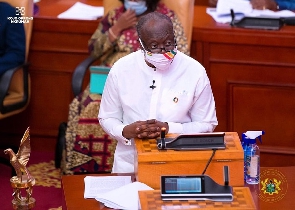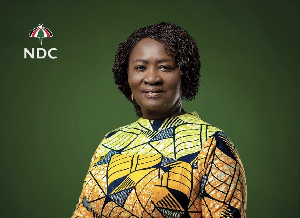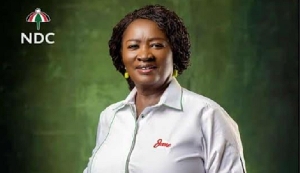 Finance Minister, Ken Ofori-Atta
Finance Minister, Ken Ofori-Atta
After enjoying boisterous growth rates over the last three years, the economy has been so badly bruised by the Covid-19 pandemic that any growth rate this year beyond the projected 0.9 percent would be a welcome achievement.
A post-mortem of the half-year economic performance symbolises just about everything that has gone wrong. According to Ken Ofori-Atta, the Finance Minister, government’s revenue mobilisation efforts in the first six months of 2020 yielded GH¢22bn, GH¢7.7bn or 26 percent lower than forecast at the time of the budget in November last year.
Although expenditure also breached its target, the outturn was just 11.2 percent higher than programmed. In the event, the budget deficit soared to 6.3 percent of GDP in the first half of the year, double the target of 3.1 percent of GDP.
The fiscal deficit for the whole year, which before the pandemic was seen below 5 percent of GDP, is now forecast to run into double digits, as further borrowing is projected to be carried out to weather the Covid-19 storm.
In spite of the large deficit, Mr. Ofori-Atta has set his eyes on the bigger picture of a rebound from all the disruption the virus has created.
Even before the impact of the hurriedly-put-together Coronavirus Alleviation Programme (CAP) is assessed, the Finance Minister is talking about a recovery programme of proportions never seen before in the country’s history.
In his mid-year budget review and update presented to Parliament on Thursday, Mr. Ofori-Atta announced the Coronavirus Alleviation and Revitalisation of Enterprises Support (CARES) programme, which will require an investment of GH¢100bn from 2020 to 2023, of which GH¢70bn will come from the private sector.
The Finance Minister explained that the CARES programme will be in two phases: a stabilisation phase that runs from July to the end of the year (2020), and a medium-term revitalisation phase that is aimed at accelerating the much-touted Ghana Beyond Aid economic transformation agenda.
The ambitious programme recognises the fact that the success of a medium-term initiative like this would very much hinge on limiting the damage caused by the virus. So, from now to the end of the year, which is the first phase of CARES, the government is extending the duration of some of the emergency programmes implemented to provide relief to individuals and businesses alike.
While the first phase of CARES is very crucial, the true impact of the programme will be felt in the second phase. During this period (2021-23), the Finance Minister told Parliament, government will vigorously promote the consumption of locally-produced goods and services in order to support local businesses and generate employment.
“To this end, MDAs and MMDAs will be required to prioritise the procurement of local goods and services. The aim is to achieve up to 50 percent of all government procurement sourced locally,” the Minister said.
Mr. Ofori-Atta’s audacious plan would not have been complete without a mention of some of the flagship government initiatives. Under the plan, government will review and optimise implementation of programmes such as One District, One Factory, Planting for Food and Jobs, Free SHS, among others, for greater results and fiscal sustainability.
As far as infrastructure development is concerned, government intends to pursue public-private partnerships (PPPs) or concession arrangements.
“In our economic revitalisation and transformation, government has an important role to play by ensuring that the critical enabling factors are in place to make it possible for the private sector to invest and drive the expansion of production, jobs and exports. Government will, therefore, take resolute measures to improve the business environment for the private sector,” Mr. Ofori-Atta promised.
No empty words
The sheer audacity of the plan laid out by the Finance Minister creates some doubt about its feasibility, especially as some of government’s other less sophisticated programmes have failed to achieve meaningful results.
Mr. Ofori-Atta is not oblivious to that cynicism. “We all know that a plan is only as good as its implementation; it is not enough just to raise the money. So, for the CARES programme, execution, execution, and execution will have to be the watchwords. The CARES Revitalisation and Transformation Agenda is about national survival and security, just like our response to the COVID-19 pandemic itself.
“Therefore, we need to approach it as such, with a resolute focus on implementation. We will have to pursue a ‘Whole-of-Government’ approach, and in close collaboration with our private sector and other stakeholders, and with their support as well. And we will make sure they happen,” he said.
Financing
It is estimated that the CARES programme will require around GH¢100bn of spending and investment inflows to fully fund the initiatives from 2021 to 2023.
However, given the severe fiscal strains, the Finance Minister said government is expecting the bulk of the required funds—at least GH¢70bn –to come from the private sector, both domestic and external.
“Government will, therefore, be proactive in making Ghana an attractive place for private investments—number one in West Africa and among the top five in Africa. Furthermore, government will do its part in financing CARES.
We will, therefore, implement radical reforms to increase public revenues and to increase the efficiency of public expenditure management. We are putting in place policies and reforms to raise the tax-to-GDP ratio from the current level of 13 percent to 20 percent by 2023,” the Minister said.












